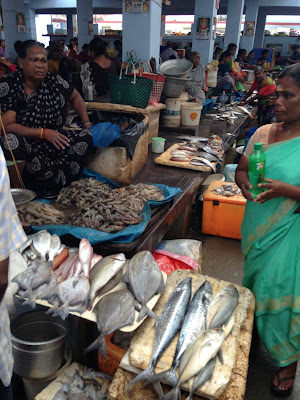The Hindu religion is confusing. On the one hand, there is deep philosophising in some of its sacred works, while on the other hand there are the fanciful cavortings of its mischievous characters that are described in the anthology of Hindu myths and legend. Hindu temples are filled with multi-limbed humans with technicolour complexions, alongside semi-human beasts which have alternately animal heads, or animal bodies. I do not find this aspect easy to take seriously.
By contrast, I can meditate for a long walk on the deep wisdom of some of India's sages, like this quote from Paramahansa Yogananda:
By contrast, I can meditate for a long walk on the deep wisdom of some of India's sages, like this quote from Paramahansa Yogananda:
Be as simple as you can be;
you will be astonished to see how uncomplicated and happy your life can become.
This is so true for me over the past three years: my life is much richer now that I am poorer . . . But now is the time to return to our sheep, as the French would say, and write about the colourful display of religious observance we've been watching here for the past few days.
A couple of days ago my breakfast bowl of porridge was disturbed by drumming in the street outside, as the first procession wended its way along the road.
There was the hammering thud of the drummer, competing with the Shehnai, a wind instrument that looks a bit like an oversized clarinet.
The music of the shehnai is definitely (like much in India )an acquired taste. It reminds me of a cross between a kazoo and a child's plastic trumpet.

The shehnai is, however, a serious instrument in Indian music scene, and no wedding would be complete without a virtuoso shehnai musician, both in the parade through the town and at the celebration with a few hundred guests.

The shehnai is, however, a serious instrument in Indian music scene, and no wedding would be complete without a virtuoso shehnai musician, both in the parade through the town and at the celebration with a few hundred guests.
The procession for this week's religious festival was not a wedding, so there was no groom on a white horse, such as can still be seen in many modern Indian weddings, whether they are being celebrated in the city or the country.

The parade on this occasion was entirely of women, who each carried a brass pot on the head. I couldn't see what the pots contained, but each one had some sort of greenery making a fringe that hung down to the bearer's brow.

All the women were dressed in smart, freshly pressed saris in every imaginable colour of the rainbow.

The parade on this occasion was entirely of women, who each carried a brass pot on the head. I couldn't see what the pots contained, but each one had some sort of greenery making a fringe that hung down to the bearer's brow.

All the women were dressed in smart, freshly pressed saris in every imaginable colour of the rainbow.
The column walked on at a measured pace, sedate and gracious, while the drum thundered and the shehnai wailed.
I took an auto-rickshaw into town to collect some trousers that had been altered (alteration fee 99p) and we were constantly held up by similar processions coming in all directions.
India has its priorities right. If a sacred cow wanders down the street, traffic stops, and if a procession of women strides slowly down the street, traffic stops.
And in the evening, the pedestrians take over completely, as all the temples and shrines are illuminated, and neon tubes are strung up along the roadside, wherever there is limited street-lighting.
 |
| Ganesha - the houshold god of hearth and home |
This morning, I awoke to the sound of mortars exploding with monotonous regularity.
I had a sense of déja vu, with memories of ongoing terrorist activities on a nightly basis in my first overseas posting after University, in the then-still-British-colony of Aden.
A pause, and then a shattering boom, but it couldn't be anything to worry about, as the strings of loudspeakers were still wailing their mournful melodies. In time I realised that for just the same purpose as similar explosions in Mediterranean countries, these were all part of the process of driving away the evil spirits.
And then I wasn't worried, because my childhood nickname had been Jumbo, and I knew I could rely on the patronage of my dearly revered Ganesha.










